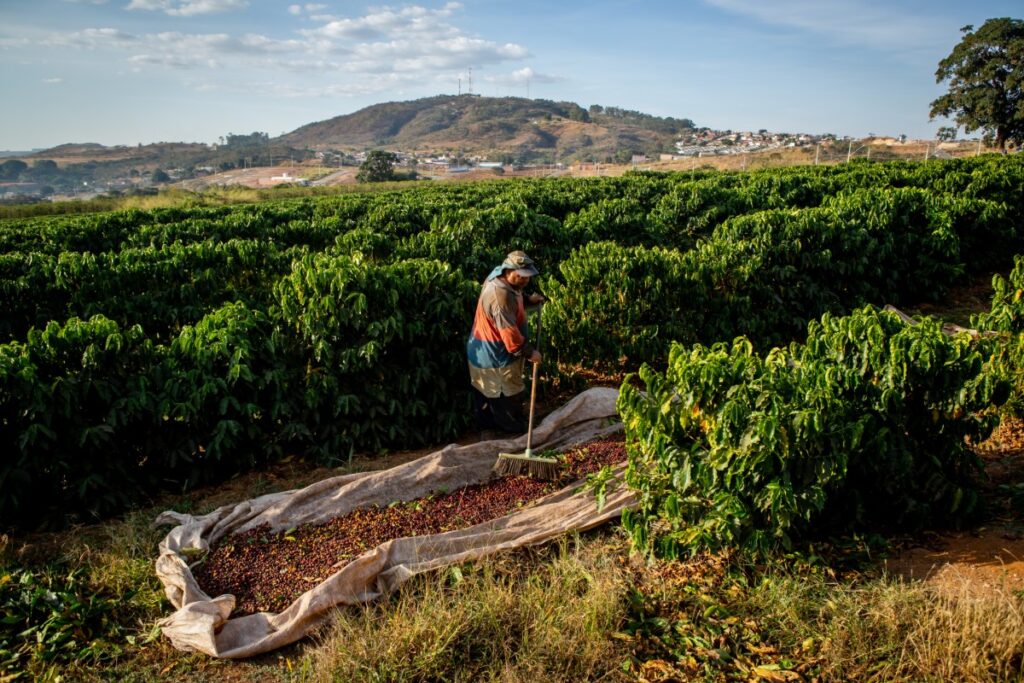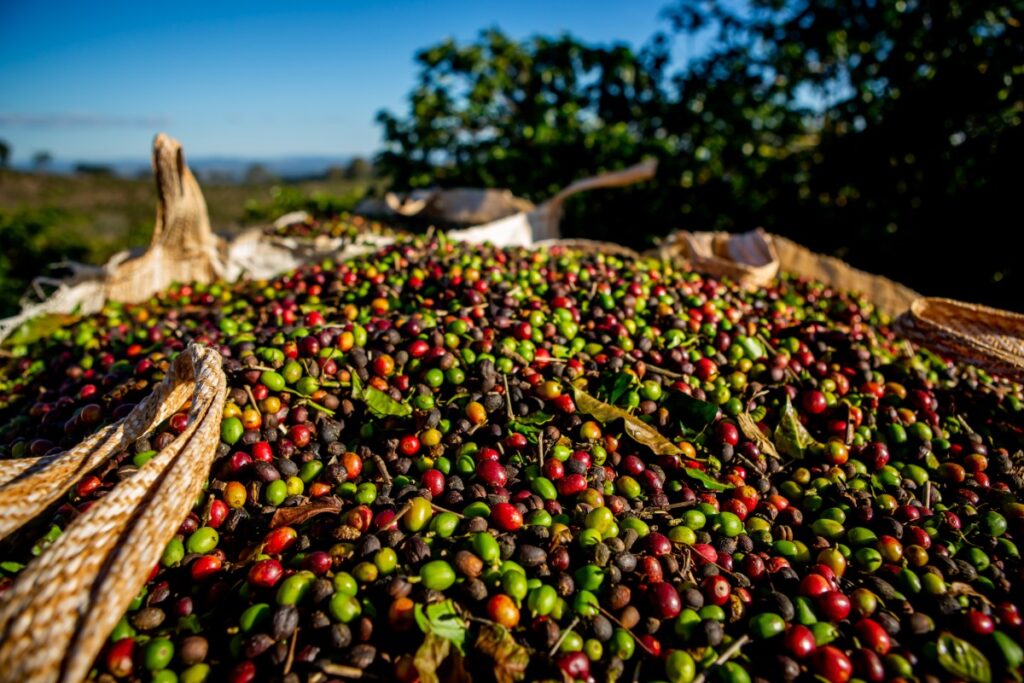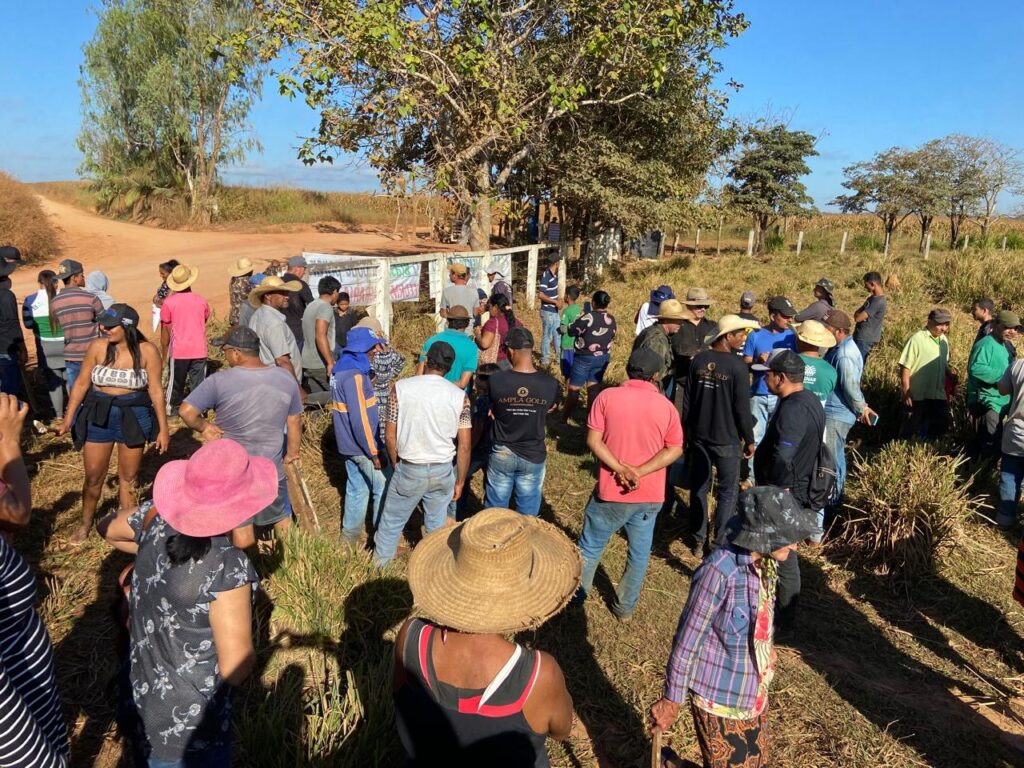THE LARGEST COFFEE cooperative in Brazil, Cooxupé (the Regional Coffee Growers’ Cooperative of Guaxupé) said it has suspended five growers caught using slave labor during the 2025 harvest. The five are among 15 coffee producers fined for the practice during inspections carried out by Brazil’s Ministry of Labor and Employment between April and August, according to records obtained by Repórter Brasil.
A 12-year-old child, a 16-year-old teenager, and a 72-year-old man were among the 81 victims rescued from farms linked to the cooperative. In all five cases, labor inspectors from Brazil’s Ministry of Labor found workers subjected to degrading working and living conditions and to restrictions on their freedom due to illegal debts—two of the four criteria that, under Brazilian law, define conditions analogous to slavery.
In 2024 Cooxupé recorded the highest revenue in its history: BRL 10.7 billion (about USD 2 billion). Of the 6.6 million coffee bags it received, 80% were exported. The cooperative ranks among Forbes’ 100 largest agribusiness companies in Brazil and supplies industry giants such as Starbucks, identified as one of the cooperative’s main clients.
“Given its size and influence, the cooperative should set an example in guaranteeing decent work. After all, they boast worldwide that their coffee is sustainable,” said Jorge Ferreira dos Santos, coordinator of Adere-MG, an organization that fields labor-rights complaints and alerts authorities. “Between 20% and 40% of the slave-labor cases we handle involve Cooxupé growers,” he added.

Cooxupé told Repórter Brasil it blocks any member as soon as it “receives official notice of labor-rights violations,” halts delivery of their coffee, segregates any beans already received and returns them in full. The cooperative said it “bases its operations on respect for people, the dignity of work and social responsibility” and runs a human-rights training program.
Starbucks, contacted for comment, said it buys coffee from only “a small fraction” of Cooxupé’s more than 19,000 member farms and only from those verified through its C.A.F.E. Practices program, which it described as including “robust audits.” The company did not clarify whether the farms caught using slave labor were or had been part of the program, but stressed it takes “any allegation of inadequate working conditions extremely seriously” and is “committed to responsible coffee sourcing.”
A 12-Year-Old in the coffee fields
On May 21, a 12-year-old child was rescued during the coffee harvest on the Rio Claro and Recanto farms, owned by coffee grower Luiz Carlos Avelar, located in Conceição da Aparecida, a municipality in Minas Gerais, Brazil’s main coffee-producing state.
According to official documents from the inspection, obtained by Repórter Brasil, the boy and his parents had left the municipality of Aracatu in the state of Bahia, about 1,200 km away, to work during the harvest. Questioned by labor inspectors, the child said he had left school to accompany his parents in the coffee harvest.
The tasks performed by the child during the coffee harvest are included on the list of the Worst Forms of Child Labor. “This is not a work activity, but rather a risk to the child’s physical and psychosocial development,” the labor inspectors summarized.
In all, 12 workers were employed without formal work registration and without the protective equipment for harvesting that should have been provided by the employer. The inspectors also found that the workers had no access to potable drinking water or toilets in the field. Even with these irregularities, the inspection concluded that only the 12-year-old child was being subjected to conditions analogous to slavery.
Repórter Brasil was unable to locate Luiz Carlos Avelar for comment. The space remains open for future statements.
False promises and indebtedness
On June 24, 19 workers who had left the state of Ceará, in Brazil’s Northeast, to harvest coffee were rescued at Fazenda São Thomaz, in Caconde, in the state of São Paulo. The property belongs to coffee grower André Pereira Alves, also a member of the Cooxupé cooperative.
In the city of Mauriti, 2,300 kilometers from the farm, they were recruited with promises of good working conditions and wages by a “gato,” the popular term for labor brokers in the countryside. According to the inspection report obtained by Repórter Brasil, the cost of the trip was paid by the workers themselves, which violates Brazilian labor law, which requires that hiring be formalized from the place of origin.

The indebtedness, false promises and irregular transport of workers are some of the hallmarks of human trafficking for labor exploitation—conditions identified at Fazenda São Thomaz and highlighted in the inspectors’ report.
Questioned by Repórter Brasil, André Alves responded through his lawyer that “he understands that the situation experienced by the workers does not fit the definition of conditions analogous to slavery” because “the workers were being paid amounts well above what most Brazilians receive” and that “they had a car available for transportation.” Alves also noted that, even without agreeing with the classification of slave labor, he complied with all the requirements established by the labor inspectors.
Toilet in the bushes and cold food
Also on June 24, three workers were rescued at Sítio Martha Helena, in Conceição da Aparecida, also in Minas Gerais. The property belongs to producer Ornelas Rodrigues Borba, another Cooxupé member.
The labor inspectors found that the workers had no access to drinking water or toilets in the coffee fields, forcing them to relieve themselves in the bushes. Without a suitable space for meals, one of those rescued told the inspectors that he ate his lunch cold, sitting in the shade of the coffee trees.
Ornelas Borba did not respond to the questions sent by the reporters.
Teenager and elderly man rescued
Two days later, on June 26, two other properties in Minas Gerais were caught using slave labor.
In Divisa Nova, a group of 47 workers was rescued, including a 16-year-old teenager. They were harvesting coffee at Fazenda do Meio, owned by producer Nilceu Patrocínio Muniz Junior.
As in Caconde, the workers were migrants from Brazil’s Northeast, this time from the states of Alagoas, Pernambuco, Bahia and Piauí. The record of the slave-labor inspection shows that the group was paid with checks that could only be cashed at a supermarket indicated by the “gato” himself. According to the inspection document, this prevented the workers “from freely disposing of their wages.”
In the municipality of Passos, Minas Gerais, inspectors found a 72-year-old man and ten other workers subjected to conditions analogous to slavery at Fazenda Engenho Novo. The property belongs to Cooxupé member Wagner Luiz de Lima.

Pedro*, one of those rescued, said that Wagner de Lima tried to persuade the group to tell labor inspectors a different version of the conditions on the farm. “He wanted us to lie. To say that we were using the bathroom in his house and getting water there. But I told the whole truth,” he said in an interview with Repórter Brasil.
The reporters were unable to reach producers Nilceu Muniz Junior and Wagner de Lima. The space remains open for future statements.
A Deep-Rooted Problem
This is not the first time that Cooxupé, responsible for 10% of Brazil’s coffee exports, has been linked to cases of slave labor in its supply chain.
In April, Repórter Brasil reported that four of its members had been included in the federal government’s Registry of Employers who have subjected workers to conditions analogous to slavery, known as the “Dirty List” of slave labor. At the time, the cooperative said that after the list was published, it blocked those producers.
Created in November 2003, during the first government of President Luiz Inácio Lula da Silva, the Dirty List is updated every six months by the federal government. The names of employers are included after those cited have exercised their right to defend themselves in two levels of administrative review and remain there for two years.
According to Jorge dos Santos of Adere-MG, the cases uncovered are “the tip of the iceberg” in a sector that involves thousands of producers and workers. “The first thing we need to do is acknowledge that the supply chain has a deep problem in labor relations,” he points out.
*Name changed to protect the worker’s identity.
Leia também

